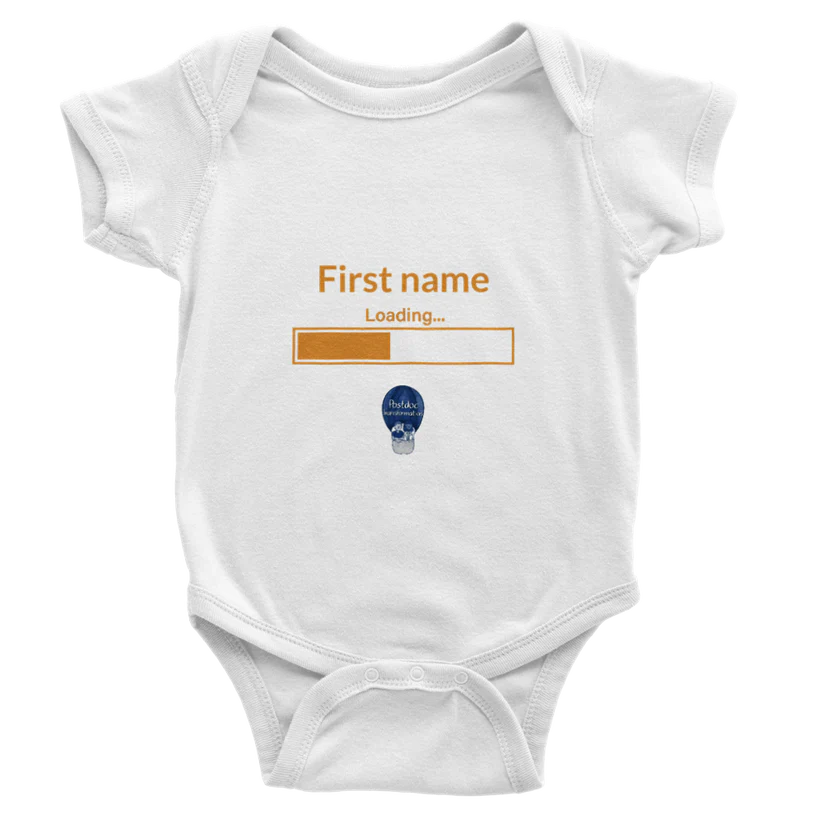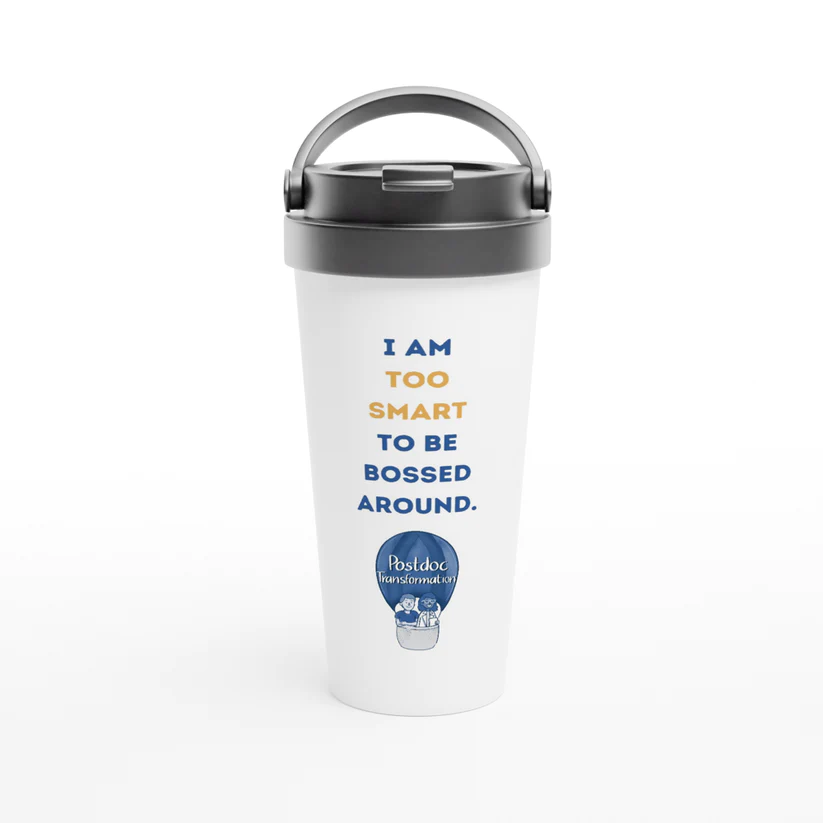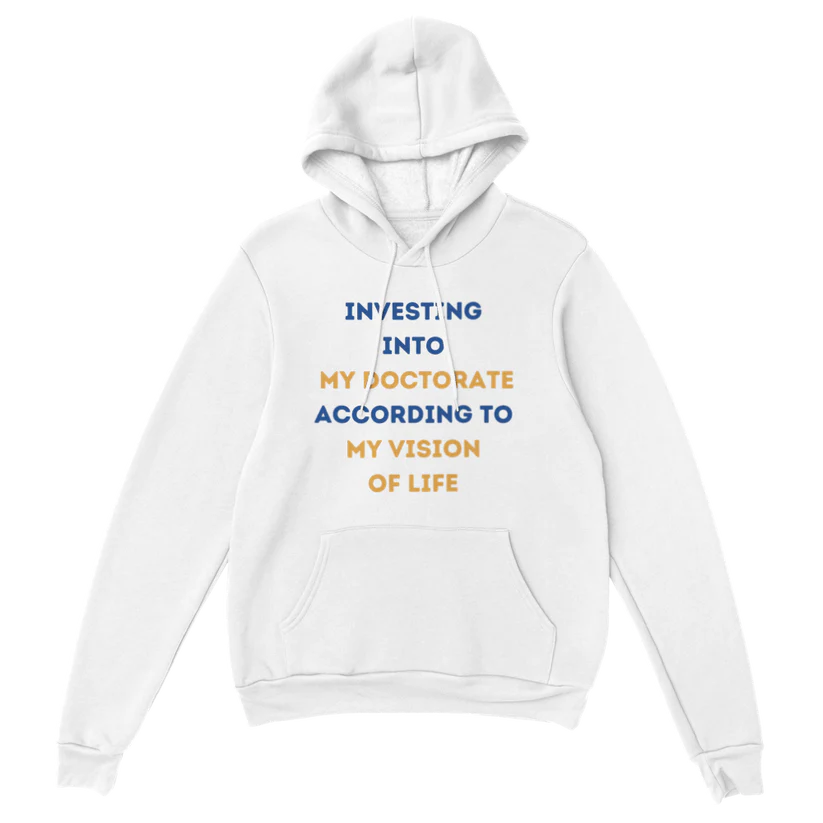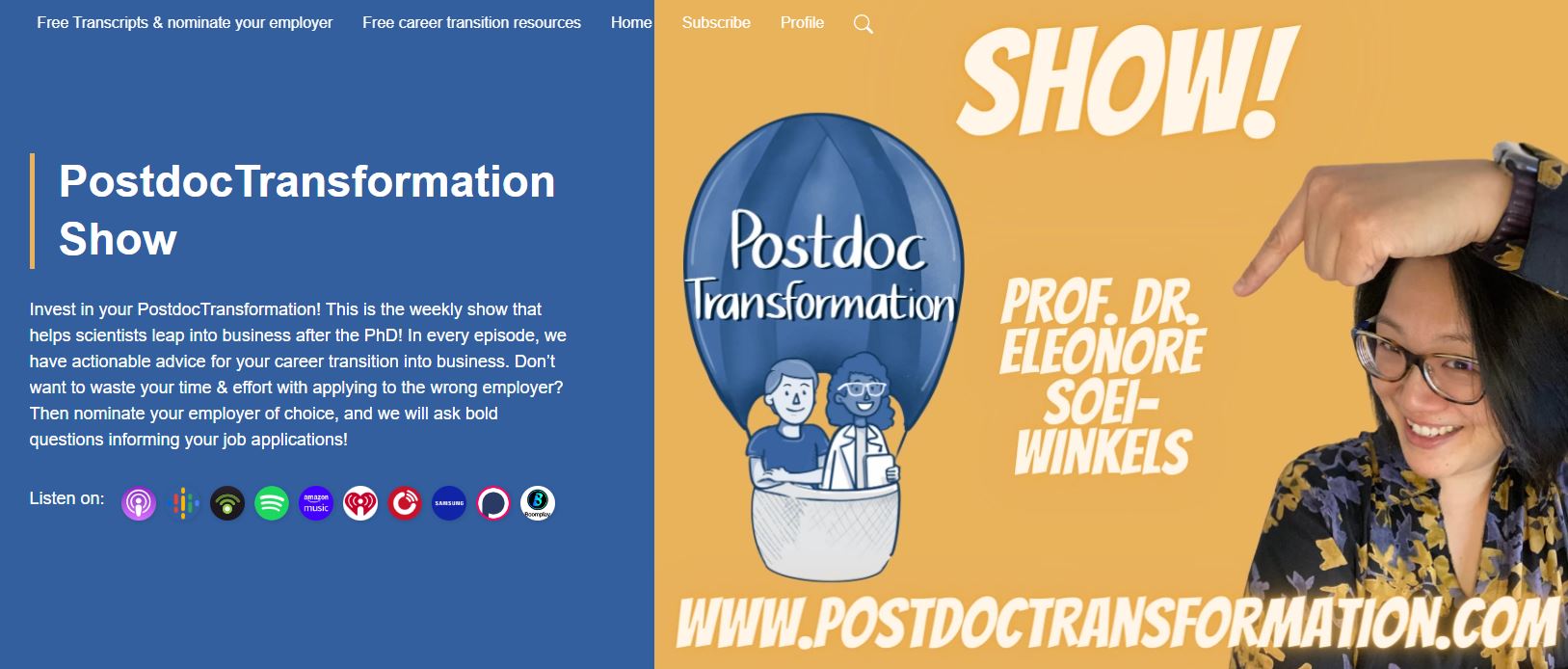Don't want to loose time? Jump to your most interesting question:
1) Do you know what your transferable skills are?
2) Do you know what your life worthy countries are?
3) Do you know, what your favorite working conditions are?
4) Do you know your values?
5) What type of people do you prefer as your leader, colleague, client & supplier?
6) Do you know your work interests?
7) How willing are you to invest to thrive in your career transition?
8) What is your vision of life?
9) Who are your role models?
10) Do you know, how informational interviews can help you?
11) Do you have a network to leap into business?
12) Will you embrace your new professional identity?
13) What kind of career paths do you know?
14) Are you finishing, what you want to leave?
15) How can you plan and prepare for your career transition?
Let's build your PostdocTransformation with this episode.
0:39
It's really first things first, before you leap into business or industries.
Before you apply to an employer, you need to check your readiness to leap out of science first.
And in the course of this episode, I will share with you 15 questions that you need to reflect way before you apply.
While or after listening to this episode, you can check your readiness to leap out of science in an instant.
1:33
So, if you're a grad student, and you've come a long way, I mean, you're in grad school, and you're nearly finishing your degree.
And you're thinking, well, academia isn't really for me, right? So, science seemed great.
But in this crisis, personally, or also in the world that was happening in here, you want to exit, and you're thinking you're nearly there.
But now what, and at these crossroads, you can then decide to stay within academia to pursue a postdoc or not, and try to get a tenure track position and also to become a professor eventually, or you could decide to leap out of science into business and industries.
And this is why you should listen.
1) Do you know what your transferable skills are?
Your transferable skills are the ones that you have gained in your PhD at graduate school, and maybe also in your life and also in your undergrad studies that you can then use and monetize outside of the PhD in industry or business.
So, the question of someone who recruits you potentially is “how can we use your skills to make more or you know, make money to create value in our business context”.
And these transferable skills can fall into three categories. One is "people". And the other one is "data". And the third one is "objects".
So, for "people", that's like leading people, developing people, teaching, communicating for or with them, working for or with them, working in teams, etc., working with diverse people like intelligent, but also not so intelligent people.
You have to be aware that we are quite homogeneous in academia, in terms of intellectual capacity, but the real world has so much more to offer.
And we have to be able to communicate our ideas in a way that others can understand and also relate and work with that.
So, we tend to communicate in ways that are maybe intimidating for others. And that's why it's so important to focus on the people aspect.
The second category is "data". And I think that probably we all know what we mean with data because we are working with data and research is about creating insights based on data.
That could be quantitative, statistical numbers, etc. But of course, could also be qualitative. So, interviews and something like that.
And I think that our research skills, our empirical skills really contribute a lot of value into creating new products, new services, especially in today's world where data is, you know, abundant, but understanding the data is a very rare skill especially researchers have.
And then we can also work with "objects" like immaterial objects or hands-on objects.
I know someone who has been working with rats, so rodents, and he's got really good hands to work with them, and to do surgery and something like that.
Or like working with a microscope, something like that, that is also objects, but it could also be virtual objects, digital objects, so that you can create new things, new concepts, something like that.
5:33
Watch my Reel on being lucky because I niched down in my PhD, LOL.
2) Do you know what your life worthy countries are, and not only just for you, but also for your future partner, and also your future family, if applicable?
Why is that important? Because especially, if you are changing and leaping into a business that is somewhere located in another country, or when you think that now you want to create a better life for yourself and go with a PhD into a country where you think that you can build a new future for yourself, then that affects not just you, but also your extended family.
Because otherwise, even if you could be happy, they wouldn't be. And that's why it's so important.
Because I know that for my community of LGBTIQ+ community it's really important to live in cities where you and your loved ones are safe.
Where you are a woman, or if you are a Muslim, or whatever, it is important that you feel safe, and that your kids will be also appreciated in that society.
And that's why it's so important.
As a working mom, I can only encourage you to work at a workplace, where you as a parent, father or mother are respected and appreciated. Let us know, if you want a dedicated episode on how parenting boosts leadership!
Maybe someone you know in your grad school or lab who is pregnant or a new father, mother or parent. Our onesies are the perfect gift for the next baby shower! Visit our shopify for variants for scholar parents!
6:54
3) Do you know, what your favorite working conditions are?
So, do you like to work at special times, like in the mornings, or in the afternoons or in the evenings?
Or would you want to work in a big city or more in local suburbs?
Do you want to work remotely? Or in presence or in person? What kind of contract do you aspire?
Most of us, who leave academia as a PhD, probably have only experienced time limited contracts.
So, a contract that is unlimited, and also has a better salary, etc., has a better compensation package, better development opportunities etc. is really huge for us.
Most of us have been deprived.
And that's why it's so important to know your work, and to say, yes, now it's my time to capitalize on all the hard work I've put into gaining this PhD.
Remember, you are too smart to be bossed around!
4) Do you know your values?
8:11
And that's why you should also be very clear about what you want to achieve and negotiate.
Even if your values aren’t just about money, you need to think about your values, your internal values, what is so important for you, that you what is an important need for you that you want to satisfy.
And that is maybe recognition or appreciation.
And that does not just entail financial compensation, but it's also about respect and intellectual freedom and whatever it is for you that you value so deeply to your heart, that you need to align that with the organization's corporate culture.
Because if you land in a corporate culture, a company's culture where they do not treat you with respect, but respect is one of your strongest values, then you will be very unhappy regardless whether they pay you a lot of money, or they don't.
So, you need to be sure to think about your own values first.
So that you can then look out for the right companies who are offering you the appropriate good context where you can develop where you can thrive because your values have an alignment.
9:38
5) With what type of people would you like to work for as your leader or with your colleague and your team and also for in terms of client and supplier?
Because at the end of the day, you will be working in a supply chain with them together with them as a team, and that means you will have to work with them closely, and depending on your own personality, but also on their personality, and also their personal upbringing or socialization.
That could be also very, you know, very familiar, very homogeneous or even not. So that's why you should be also thinking about that.
And earlier in this episode, I talked about intelligence.
And I just want to make sure that you understand that having an academic degree or not, does not have to be tied to intelligence.
I've seen people with a doctor title doing stupid things.
And I've seen people without an academic degree, doing genial things.
So that is not for you an orientation to see people without a doctoral degree to be minor or whatever.
10:58
And now it's time to thank Company ABC, who sponsors this episode of the postdoc transformation show, I would now be reading the company's answers to one of six bold questions so that you can choose to apply.
For example, number one, describe your most valuable experts versus leaders in your company. Have they typically earned a doctor title?
Or number two, for which of your company roles or units, do you encourage somebody with a doctor title to apply?
Number three, how would you describe your organizational culture in which your most valuable experts and leaders thrive in.
6) Do you know your work interests?
11:48
So, what do you wish to pursue in your new role or job? What are the topics that you want to deal with daily? If you don't like to work with topic ABC, but you have to deal with that and work on data to do that, or work on something, you know, new products, new services, client negotiations, presentations, pitches, etc., but you don't like that topic, that will be really hard for you to endure on a daily basis.
And that's why it's so important that you know, your work interests so that you can then align to these topics, and then do the role or, you know, the job, whatever it is.
12:36
7) How willing are you to invest the time and your intensity to thrive in your career transition?
So probably, you've been investing into your doctorate 100% of your time.
And if you want to leave, as soon as you are ready and inclined to lead, you need to invest now to prepare your career transition, that does not happen overnight.
And that's why you need to be willing to invest some time and, in some intensity, so that you have all that it's needed to leap into business or industries.
So maybe you need to take time for doing a new course, have a side project, which builds your transferable skills, if you don't have any at the moment, or you want to do a research sabbatical, so to speak, and have an unpaid, I mean, it's unpaid, usually anyway.
But maybe you want to have an internship, if that's possible.
In Germany, it's not possible because you have already earned your master's degree. So, you shouldn't be doing an unpaid internship.
But you could be doing something like that, so that you gain business exposure.
14:07
8) What is your vision of life?
What do you envision for yourself, not just beyond the PhD, but rather from the perspective when you are 70 or 60? You know, hopefully, you'll get into your 80s.
But what do you want to have achieved?
Remember to invest into your doctorate according to your vision of life!
Looking back, and then maybe you are in your 20s or 30s.
And there is still abundantly time to make new choices, choices to, you know, career transition from science into industries or business, and then you still have 40 years or so, to make your vision come to life.
And that's why it's so important that you know:
Do you want to have a family? Do you want to work in whatever field? Do you want to work all day long?
Or do you want to be able to have a passive income somewhat, and that's what you need to then work for in your career transition?
Talking about passive income, if you get your grad school to book our e-courses, online workshops and memberships, you will earn a recurrent 50% sales commision! Sounds interesting? Click here!
9) Who are your role models?
And maybe now, you're thinking, phew, I don't know anyone like this.
My professors aren't like this. The postdocs aren't like this. We all just go into tenure track positions, and also try to become a professor.
And then if someone fades out, that's like a persona non grata. No one talks about them, because we think that they are a failure.
But actually, you need to have role models that show you the ropes that teach you how to transition their career, from science into business, how they did it, and that is just one inspiration, you will have to find your own way, because you can't walk in their shoes.
But you still have to have this inspiration, an encouraging person who can show you know that it is possible, beyond your imagination at the moment.
Beyond the imagination of an overly envious, toxic principal investigator who doesn't want you to survive and to thrive in business.
And that's why you need role models.
16:34
10) Do you know, how informational interviews can help you?
And if you don't have these role models, within your academic setting, then you need to go out and network somewhere else so that you can have the social learning you deserve for your career transition into business.
So, the question 10 relates to do you know how you can do informational interviews with the role models that you have found through external networking.
With these role models, you can then explore new industries, see through their eyes, so that you can think of new jobs, because they have experienced these jobs, or they know that these jobs do not work like this in the future anymore.
So, they have insights. And you need to be able to ask the right questions at the right time, to the right people so that you get a lot of information.
So, you have an informed decision making for your job applications.
17:42
11) Do you have a network to leap into business?
And you can connect with me, for example, and I have a wide network of business people, especially in LinkedIn (see above), but I'm more fun on TikTok & Instagram, LOL.
But if you want to dive into that, academic networking and business networking are totally different. And I have e-courses on that on our platform: So, just let me know whether I can serve you there.
But essentially, networking is your key to find the right people as your role models so that you can ask them the right questions for your information interview so that you have an informed decision making for your job application.
That's why it's so important that you do the networking way before you start to apply for a new job in business.
18:38
And did you know that I offer deep dive courses, workshops and memberships at graduate school, maybe also at yours in the future, as your graduate school coordinator, whether they want to book my services so that I can deliver them to you 24/7 365 on your mobile device. Check them out by clicking on below picture!
12) Will you embrace your new professional identity?
19:00
And networking can also help you shape your professional identity.
Do you know and also like your new professional identity?
Because if you don't like to be that person and you think "I don't want to be a capitalist, I don't want to be someone in business. It feels like a sellout. It feels like someone who is salesy and stuff like that."
Well, you need to be able to sell your own transferable skills to someone starting from your job application process.
Why should a company recruiter hire you? Because they want to increase their value, their contribution contributions, and if you can't explain it to them why you should be at their table, then it will be hard.
So, you need to find out whether that professional identity of your role models is something that you want to emulate as well.
And that has to be then clear cut, you can't be ambiguous in the sense like “Actually, I really want to be a researcher. But now I have to leap into business”.
That's like dating someone who doesn't really want to be dated, because he or she, or it thinks about the past boyfriend or partner or girlfriend, you know, it's like, "well, are we are we dating now? And are you interested in a common future? Or are you still not over the other person?"
You need to have a professional identity that really is clear and cut.
And that also is to be customized.
You can't apply to consulting, but also to corporate jobs, but also to whatever, or even research and development and behave the same way.
And that whatever it is, then needs to be done with confidence.
And that's why it's such a long process, because it's changing your professional identity from being a scientist into someone who is a founder, who is an entrepreneur, who is a consultant, who is whatever it is, but you have to play this role with confidence.
Otherwise, no one will buy that. And maybe now you're thinking, wow, buying, selling... Maybe it's just not for me.
And then I can reassure you that you should think about career paths.
21:43
13) What kind of career paths do you know?
So nowadays, career paths, most of them are nonlinear, where the world is evolving so fast, and so many changes are unprecedented.
Most of the people working in business, tend to have a nonlinear background.
And it's okay to have a different phase of your life where you're working as a consultant.
And then once you're finished with that, once you have outgrown that category, you can then proceed to the next phase, where you find yourself as a founder or something like that.
It's just one by one, and not at the very same time.
And that's what I was saying before, you shouldn't apply for the very different kinds of roles with the same confidence, your acted professional identity, but instead, you need to think of what is your next step.
And your next job does not have to be your job for your life, especially in nowadays time. Usually, people will be working in one role at one company just for a couple of years.
So why not just trade in the uncertainty of doing a postdoc and the uncertainty to become a professor, with the uncertainty of thriving in a new role outside of academia, and then maybe gaining a lot of more diverse experience that makes you much more unique, as compared to your colleagues who have always stayed in academia.
23:38
14) Are you finishing, what you want to leave?
So, are you hooked now?
Do you want to leap out of science?
If so, then question number 14 is so important for you.
Especially if you still have a couple of months’ time, so that you can then tie everything together, you need to tie your loose ends, in terms that you need to finish and you're on you need to publish all your research efforts, because then it's easier for you to leap into business.
One is you have closure. That is psychologically important for you and yourself (I’m a management coach and professor of industrial & occupational psychology), and also your teammates.
Also, it's very promising and also encouraging for the business recruiter for the company, for your new boss or leader, when they see that you can devote 100% into the new job.
So, you're not still, you know, one foot in one world and the other foot in the old world.
24:39
15) How can you plan and prepare for your career transition way before your graduation?
And that's why it's so important that you think about the following.
Probably like a year or so before? Because to be honest, when you started your PhD, you probably were in your honeymoon and then shortly after, when you've done your courses and everything, and your first experiments failed, and you're tried to publish nevertheless, and something like that, then reality hits.
And you probably think that, well, you started this, and you now double down on that.
And that's also fine. Because you need that momentum to finish your PhD.
But if you ever think maybe academia is not for you in your first or second year, that's even ideal to think about finishing the degree knowing that you want to leave anyway.
And that helps you to invest into your doctorate according to your vision of life.
Remember that question number 8. If not go back.
Because it's so important that you know why you are doing something that can then align all your resources that you want to invest into the right, you know, directions, right.
26:07
Hey, have you found this episode so far helpful for yourself? Well, maybe you can subscribe and also share this episode with your PhD bestie. Because that would encourage us to help the underprivileged, underrepresented and underserved early career scientists leaping into business. And now back to the show.
And once you have determined your readiness to leap and you think yes, this is the way forward you want to transition into business or industries, then you can enroll in your free email course with 10 actionable bingeable email lessons until you start your job in business.
Remember, you are a future doctor who means business!
Thanks for listening,
Eleonore and Team PostdocTransformation!
P. S. Did you know, that Eleonore recorded this episode because she received questions from the "Instant check your readiness to leap out of science" participants, as the yes/no questions left room for interpretation (we just added summaries for each questions in the instant check)?
So, Eleonore LISTENS to the feedback of our PostdocTransformation community.
Chances are quite high, that you are new in our community! We wholeheartedly encourage you to ask questions regarding the show or a given episode or to share your feedback or Aha moments. It would mean the world to us, to know that we make a difference in your PostdocTransformation.















